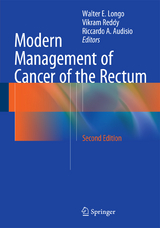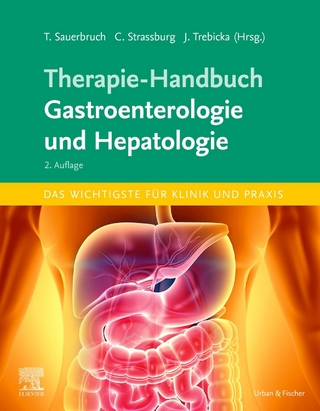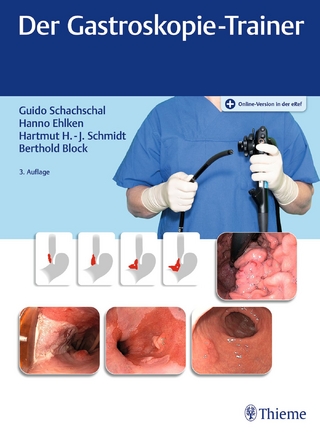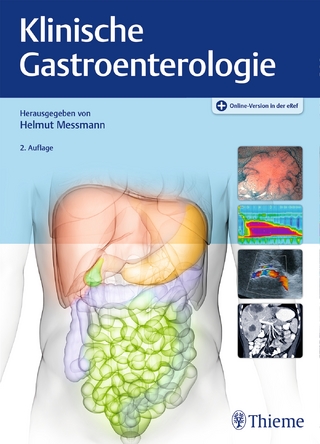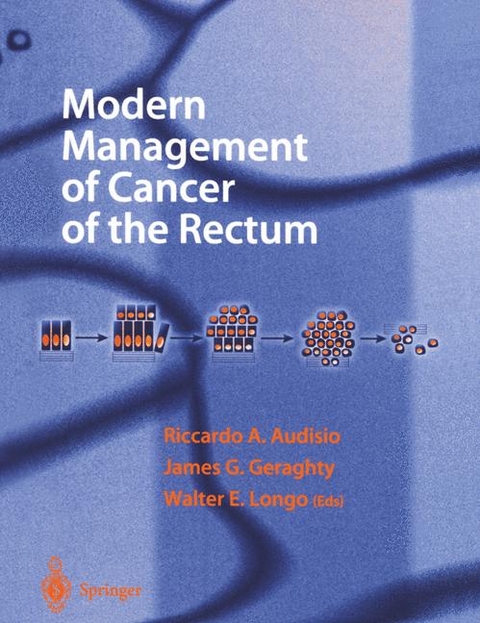
Modern Management of Cancer of the Rectum
Springer London Ltd (Verlag)
978-1-4471-1070-5 (ISBN)
- Titel erscheint in neuer Auflage
- Artikel merken
1. Evolution of the Surgical Management of Rectal Cancer.- Perineal Approach.- Transanal Excision.- Transsacral Resection.- Abdominosacral Resection.- Abdominoperineal Resection.- Abdominoanal Approach.- Anterior Resection.- The Present.- References.- 2. Pathology and Staging.- Resection Specimen.- Total Mesorectal Excision.- Histological Features of Rectal Cancer and Their Prognostic Significance.- Histological Type.- Tumour Differentiation.- Invasive Growth Pattern and Peritumoral.- Lymphocytic Infiltration.- Completeness of Excision.- Serosal Involvement.- Lymph Node Metastases.- Extramural Vascular Invasion.- Surgical Resection Margins and Local Recurrence.- Local Recurrence.- Longitudinal Resection Margin.- Circumferential Resection Margin.- Staging of Rectal Cancer.- Staging Systems Currently in Existence.- Dukes' Staging.- TNM Staging System.- Dukes' Staging Versus TNM.- Role of Pathology in Assessing the Quality of Rectal Cancer Surgery.- Quality of Preoperative Imaging and Pathology Reporting, and the Use of Reporting Proformas.- Conclusions.- References.- 3. Genetics, Screening and Chemoprevention.- Genetics.- Tumor Suppressor Genes.- MMR Genes.- Oncogenes.- Screening.- Average Risk.- Moderate Risk.- Increased Risk.- Chemoprevention.- NSAIDs.- Calcium.- Antioxidant Vitamins.- Circumin.- Perillyl Alcohol.- Oltipraz.- Selenium.- References.- 4. The Role of Imaging in the Diagnosis and Staging of Primary and Recurrent Rectal Cancer.- Diagnostic Imaging in the Staging of Primary Rectal Cancer.- Clinical Evaluation.- Contrast Examinations.- Endorectal Ultrasound.- Computed Tomography.- Magnetic Resonance Imaging.- Positron Emission Tomography.- Radioimmunoscintigraphy.- Diagnostic Imaging in the Diagnosis and Staging of Recurrent Rectal Cancer.- Ultrasound Techniques.- Computed Tomography.- Magnetic Resonance Imaging.- Positron Emission Tomography and Immunoscintigraphy.- Conclusions.- References.- 5. Neo-adjuvant Therapy.- Preoperative Therapy.- Rationale.- Predictors of Response to Preoperative Therapy.- Results of Preoperative Therapy.- Intensive Short Course Preoperative Radiation.- Sphincter Preservation with Preoperative Radiation.- Is Adjuvant Therapy Necessary in Patients Undergoing a Total Mesorectal Resection?.- Investigational Approaches.- Altered Radiation Fractionation Schemes.- New Chemotherapeutic Agents.- Summary.- References.- 6. Restorative Procedures.- Relevant Anatomy of the Rectum and Perirectal Tissues.- Surgical Options in Restorative Procedures.- Preoperative Evaluation and Patient Preparation.- Oncologic Principles in Rectal Surgery.- Extent of Resection.- Radial Margin and Complete Mesorectal Resection.- Final Preparations for Restorative Procedures.- Technical Details.- Proctosigmoidectomy.- Low Anterior Resection.- Special Consideration: Coloanal Anastomosis.- Special Consideration: Colonic Reservoir (J-Pouch).- Outcome After Low Anterior Resection Versus Abdominoperineal resection.- Laparoscopic Rectal Cancer Surgery.- Conclusions.- References.- 7. Abdominoperineal Resection.- Selection Factors for Abdominoperineal Resection.- Tumor-Related Factors.- Patient Factors.- Intraoperative Considerations.- Preoperative Preparation.- Operative Technique.- Intraoperative and Postoperative Complications.- Bleeding.- Unhealed Perineal Wound.- Inadvertent Perforation of the Rectum.- Perineal Hernia.- Urogenital Complications.- Urethral Injury.- Colostomy Complications.- Other complaints.- Concluding Remarks.- References.- 8. Total Mesorectal Excision with Autonomic Nerve Preservation: "Optimized Surgery".- Rationale of Total Mesorectal Excision and its Relationship to the Anatomy of Spread of Rectal Cancer.- Technique of Total Mesorectal Excision with Autonomic Nerve Preservation.- Outcome of Total Mesorectal Excision.- Morbidity of Total Mesorectal Excision.- Sexual and Urinary Function After Total Mesorectal Excision.- Extended Lateral Lymphadenectomy.- Role of the Colonic J-Pouch.- Role of Total Mesorectal Excision in Upper Rectal Cancer.- Summary.- References.- 9. Laparoscopic Resections for Large Bowel Malignancy: Laparoscopic Colectomy.- Laparoscopic Colectomy.- Physiologic Aspects of Laparoscopic Surgery.- Laparoscopic Surgery for Benign Colonic Disease.- Laparoscopic Surgery for Malignant Colonic Disease.- Summary.- Laparoscopic Rectal Cancer Surgery.- Laparoscopic Surgery for Rectal Carcinoma.- Procedures of Laparoscopic Proctosigmoidectomy.- Conclusion.- References.- 10. Minimal Access Surgery for Rectal Cancer.- Preoperative Assessment.- Tumor Invasion.- Patient Selection for Local Treatment.- Size.- Exophytic Lesions.- Mobile Lesions.- Depth.- Favorable Histology.- Margin of Excision.- Therapeutic Modalities for Local Treatment.- Local Excision.- Contact Radiotherapy.- Electrocoagulation.- Adjuvant Therapy after Local Treatment.- Salvage Treatment.- Palliative Local Surgery.- Summary.- References.- 11. Postoperative Adjuvant Combined Modality Therapy.- Postoperative Therapy.- Rationale of Postoperative Combined Modality Therapy.- Results of Postoperative Therapy.- Functional Results with Postoperative Therapy.- Decreasing the Toxicity of Pelvic Radiation Therapy.- Is Adjuvant Therapy Necessary after Total Mesorectal Excision?.- Investigational Approaches.- Altered Radiation Fractionation Schemes.- New Chemotherapeutic Agents.- Summary.- References.- 12. Follow-up After Potentially Curative Therapy for Rectal Cancer.- Background.- Methods of Recurrence Detection.- History and Physical Examination.- Laboratory Investigations.- Endoscopy.- Issues Specifically Regarding Rectal Cancer.- Recommendations.- Conclusions.- References.- 13. Surgical Approach to Locally Recurrent Disease.- Clinical Presentation.- Diagnostic Evaluation.- Preoperative Therapies.- Preoperative Planning.- Operative Strategy.- Intraoperative Radiation.- Intraoperative Electron Radiation Therapy.- Intraoperative High-Dose Brachytherapy.- Results.- Extended Resection.- Future Directions.- Novel Therapeutics.- References.- 14. Metastatic Rectal Cancer.- Surgery for Metastatic Rectal Cancer.- Surgical Resection of Liver Metastases.- Surgical Resection ofLung Metastases.- Surgical Resection of Brain Metastases.- Chemotherapy Versus Best Supportive Care for Patients with Advanced Colorectal Cancer.- 5-Fluorouracil.- Mechanism of Action.- Modulation of 5-Fluorouracil with Leucovorin.- Modulation of 5-Fluorouracil with Methotrexate.- Protracted Venous Infusional 5-Fluorouracil.- Other Continuous Infusional 5-Fluorouracil Schedu1es.- Chronomodulated Chemotherapy.- 5-Fluorouracil and Mitomycin C.- Oral Fluoropyrimidimes.- Uracil-Tegafur and Oral Leucovorin.- Capecitabine.- Eniluracil.- S-1.- Irinotecan.- Raltitrexed.- Oxaliplatin.- Intra-Arterial Hepatic Chemotherapy for Isolated Liver Metastases.- Biological Therapy.- Immunotherapy.- Cytokines.- Gene Therapy.- Conclusion.- References.- 15. Rare Histiotypes.- Carcinoid Tumors of the Rectum.- Clinical Presentation and Diagnosis.- Treatment and Prognosis.- Lymphoma ofthe Rectum.- Primary Lymphoma of the Rectum.- Secondary Lymphoma ofthe Rectum.- Anorectal Melanoma.- Clinical Presentation and Diagnosis.- Treatment and Prognosis.- Neuroendocrine Carcinoma of the Rectum.- Pathology.- Clinical Presentation and Diagnosis.- Treatment and Prognosis.- Vascular Lesions.- Diffuse Cavernous Hemangioma.- Lymphangiomas.- Hemangiopericytoma.- Squamous Cell and Adenosquamous Carcinoma of the Rectum.- Squamous Cell Carcinoma of the Rectum.- Adenosquamous Carcinoma of the Rectum.- Sarcoma of the Rectum.- Leiomyosarcoma.- Kaposi's Sarcoma.- References.- 16. Quality of Life and Palliative Care in Rectal Cancer Patients.- Quality of Life: Defining and Measurement Issues.- Multidimensional Quality of Life Questionnaires.- Psychosocial Aspects of Rectal Cancer: A Brief Historical Review.- Symptoms Associated with Rectal Surgery.- Sexual and Urological Dysfunction.- Bowel Dysfunction.- Mood and Social Life.- Quality of Life Studies.- Chemotherapy.- Radiotherapy.- Surgery.- Rehabilitation Needs.- Palliative Care in Rectal Cancer Patients.- Evaluation.- Pain.- Cachexia-Anorexia.- Ascites.- Nausea and Vomiting.- Dyspnea.- Conclusions.- References.- 17. Costs of Rectal Cancer Patient Management.- Methods.- Literature Review.- Cost Analyses.- Results.- Initial Care Phase.- Continuing Care Phase.- Conclusion.- References.
| Erscheinungsdatum | 20.12.2018 |
|---|---|
| Zusatzinfo | XXI, 234 p. |
| Verlagsort | England |
| Sprache | englisch |
| Maße | 216 x 280 mm |
| Themenwelt | Medizin / Pharmazie ► Medizinische Fachgebiete ► Chirurgie |
| Medizinische Fachgebiete ► Innere Medizin ► Gastroenterologie | |
| Schlagworte | Cancer • colectomy • Colorectal Cancer • Endoscopy • Genetics • Imaging • Laparoscopic surgery • Laparoscopy • Liver • Morbidity • Pathology • prevention • Screening • Staging • Surgery |
| ISBN-10 | 1-4471-1070-6 / 1447110706 |
| ISBN-13 | 978-1-4471-1070-5 / 9781447110705 |
| Zustand | Neuware |
| Haben Sie eine Frage zum Produkt? |
aus dem Bereich
